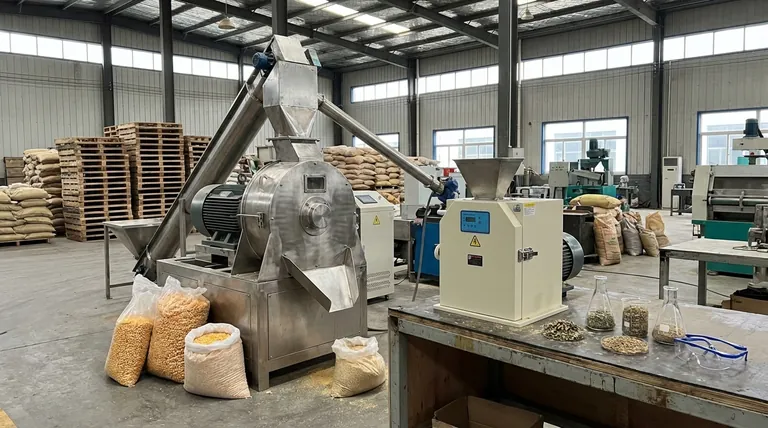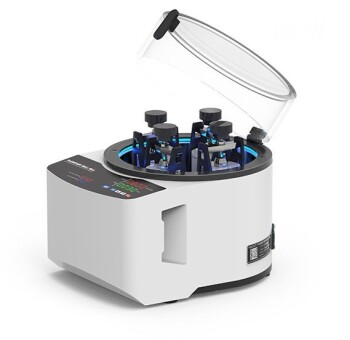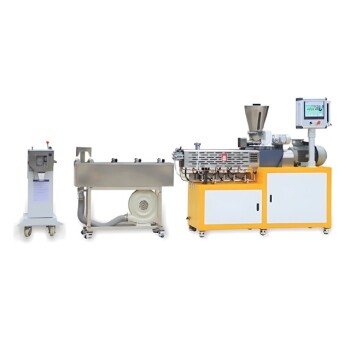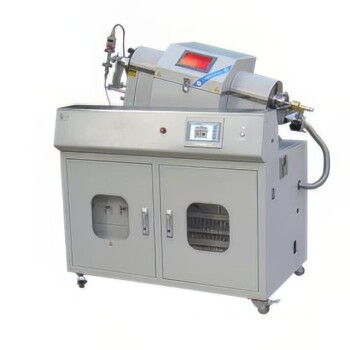In short, hammer mills are versatile machines used in any application that requires breaking down or pulverizing material. They are found across a wide range of industries, from large-scale agriculture and recycling operations to small-scale university laboratories and government testing facilities.
The fundamental purpose of a hammer mill is size reduction through high-impact force. Their widespread use stems from their simple, effective design, making them a go-to solution for pulverizing, grinding, and crushing a vast array of materials, not just in one industry but in many.

The Core Principle: Why Hammer Mills Are So Common
To understand where hammer mills are used, you must first understand how they work. Their utility comes from a straightforward and powerful mechanical principle.
Size Reduction Through Brute Force
A hammer mill is, at its heart, a steel drum containing a rotating shaft or drum on which free-swinging hammers are mounted. Material is fed into the chamber, and the rapidly spinning hammers shatter it against the inner walls and other particles.
The pulverized material remains in the chamber until it is small enough to pass through a screen or grate at the bottom. The size of the screen's perforations determines the finished particle size.
Versatility in Material Processing
Because the mechanism is based on simple impact, hammer mills can process a huge variety of materials. As long as the material is brittle enough to shatter upon impact, a hammer mill can likely handle it.
Primary Applications by Industry
This versatility makes the hammer mill a cornerstone piece of equipment in numerous sectors. Its application is defined by the material being processed and the desired outcome.
Agriculture and Feed Production
This is the most traditional and widespread use. Hammer mills are essential on farms and in feed production plants for grinding grains, corn, chaff, and other plant materials into animal feed. The ability to produce a consistent, fine meal aids in digestion for livestock.
Laboratory and Pilot Plant Testing
On a much smaller scale, laboratory hammer mills are critical for R&D. They are installed in university labs, pilot plants, and government testing facilities to prepare small, uniform batches of a material for analysis. This ensures that test samples are consistent and representative.
Food Processing
The same principle used for animal feed applies to human food production. Hammer mills are used to grind everything from sugar and spices to dried beans and bread crumbs for coatings. Mills used in food applications are typically made of stainless steel to meet sanitary standards.
Waste Management and Recycling
Industrial hammer mills are workhorses in the recycling industry. They are used to shred scrap wood into sawdust, pulverize yard waste into compost, break down plastics for reprocessing, and even shatter e-waste to help separate valuable components.
Biomass and Biofuel Production
In the renewable energy sector, hammer mills are used to grind raw biomass, such as wood chips, corn stover, or switchgrass. This creates a feedstock with a uniform particle size, which is critical for efficient conversion into biofuels or for burning in energy plants.
Understanding the Trade-offs
While incredibly useful, hammer mills are not the solution for every size-reduction task. Their design comes with clear strengths and limitations.
Strengths: Simplicity and Cost-Effectiveness
Hammer mills have few moving parts. This simple design makes them relatively inexpensive to purchase, operate, and maintain compared to more complex milling equipment. The hammers and screens are typically easy to replace.
Limitation: Abrasive or Gummy Materials
Highly abrasive materials (like glass or certain minerals) can cause rapid wear on the hammers and internal surfaces, leading to high maintenance costs. Furthermore, sticky, oily, or high-moisture materials can clog the screen, severely hindering performance.
Limitation: Inconsistent Particle Shape
The shattering action of a hammer mill produces particles that are relatively inconsistent in shape. If your application requires a uniform, spherical particle, a different type of mill (like a ball mill) may be a more appropriate choice.
Making the Right Choice for Your Goal
The decision to use a hammer mill should be based on your specific material and processing objective.
- If your primary focus is high-volume grinding of dry, brittle materials: A large-scale hammer mill is an industry standard for its efficiency and throughput, especially in agriculture or biomass.
- If your primary focus is preparing diverse samples for analysis: A laboratory-grade hammer mill provides the necessary consistency and control for research and development.
- If your primary focus is recycling or bulk waste reduction: An industrial hammer mill is exceptionally effective at pulverizing bulk materials like wood, plastics, or light scrap metal.
Ultimately, understanding the core function of a hammer mill—brute-force size reduction—is the key to identifying its value in any application.
Summary Table:
| Industry | Primary Application | Common Materials Processed |
|---|---|---|
| Agriculture & Feed | Grinding grains for animal feed | Corn, soybeans, chaff |
| Laboratory & R&D | Preparing uniform samples for analysis | Diverse materials for testing |
| Food Processing | Grinding ingredients like spices and sugar | Sugar, spices, dried beans |
| Recycling & Waste | Shredding and pulverizing bulk materials | Wood, plastics, yard waste, e-waste |
| Biomass & Biofuel | Creating uniform feedstock from raw biomass | Wood chips, corn stover, switchgrass |
Need a Reliable Hammer Mill for Your Specific Application?
Whether you're processing agricultural products in bulk or require precise sample preparation in your lab, KINTEK has the right equipment for you. We specialize in providing durable and efficient lab equipment, including hammer mills tailored for various industries.
Let us help you achieve optimal size reduction. Our experts can guide you to the perfect solution for your material and throughput needs.
Contact KINTEL today for a consultation!
Visual Guide

Related Products
- Low-Temperature Water-Cooled Touchscreen Vibratory Ultrafine Pulverizer
- High Energy Planetary Ball Mill Machine for Laboratory Horizontal Tank Type
- Mini Planetary Ball Mill Machine for Laboratory Milling
- Twin Screw Extruder Plastic Granulation Machine
- Portable High Pressure Laboratory Autoclave Steam Sterilizer for Lab Use
People Also Ask
- What are the different types of grinding mills? Match the Mechanism to Your Material for Optimal Size Reduction
- What is the purpose of a pulverizer? Unlock Material Potential with Fine Grinding
- What is the difference between grinding and pulverizing? Achieve the Perfect Particle Size for Your Application
- What is the mechanism of a cryogenic grinder? Master Polymer Powder Preparation for Additive Manufacturing
- What is sample pulverizing? The Key to Accurate and Reliable Lab Analysis



















